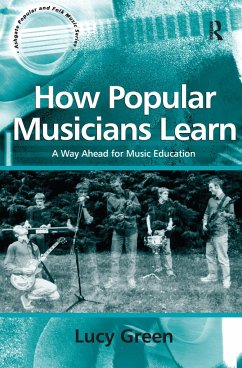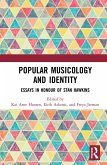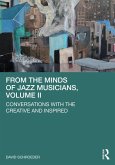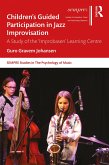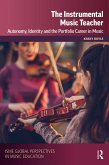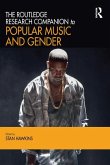- Broschiertes Buch
- Merkliste
- Auf die Merkliste
- Bewerten Bewerten
- Teilen
- Produkt teilen
- Produkterinnerung
- Produkterinnerung
Comparing the characteristics of informal popular music learning and those of formal music education, this study is based on the outcomes of research from interviews which took place between October 1998 and May 1999 with 14 popular musicians living in and around London, aged from 15 to 50.
Andere Kunden interessierten sich auch für
![Made in Scotland Made in Scotland]() Made in Scotland43,99 €
Made in Scotland43,99 €![Popular Musicology and Identity Popular Musicology and Identity]() Popular Musicology and Identity168,99 €
Popular Musicology and Identity168,99 €![From the Minds of Jazz Musicians, Volume II From the Minds of Jazz Musicians, Volume II]() David SchroederFrom the Minds of Jazz Musicians, Volume II42,99 €
David SchroederFrom the Minds of Jazz Musicians, Volume II42,99 €![Jazz and Death Jazz and Death]() Walter van de LeurJazz and Death149,99 €
Walter van de LeurJazz and Death149,99 €![Children's Guided Participation in Jazz Improvisation Children's Guided Participation in Jazz Improvisation]() Guro Gravem JohansenChildren's Guided Participation in Jazz Improvisation55,99 €
Guro Gravem JohansenChildren's Guided Participation in Jazz Improvisation55,99 €![The Instrumental Music Teacher The Instrumental Music Teacher]() Kerry BoyleThe Instrumental Music Teacher46,99 €
Kerry BoyleThe Instrumental Music Teacher46,99 €![The Routledge Research Companion to Popular Music and Gender The Routledge Research Companion to Popular Music and Gender]() The Routledge Research Companion to Popular Music and Gender45,99 €
The Routledge Research Companion to Popular Music and Gender45,99 €-
-
-
Comparing the characteristics of informal popular music learning and those of formal music education, this study is based on the outcomes of research from interviews which took place between October 1998 and May 1999 with 14 popular musicians living in and around London, aged from 15 to 50.
Produktdetails
- Produktdetails
- Ashgate Popular and Folk Music Series
- Verlag: Taylor & Francis Ltd
- Seitenzahl: 252
- Erscheinungstermin: 4. Juli 2002
- Englisch
- Abmessung: 234mm x 156mm x 14mm
- Gewicht: 392g
- ISBN-13: 9780754632269
- ISBN-10: 0754632261
- Artikelnr.: 21681575
- Herstellerkennzeichnung
- Libri GmbH
- Europaallee 1
- 36244 Bad Hersfeld
- gpsr@libri.de
- Ashgate Popular and Folk Music Series
- Verlag: Taylor & Francis Ltd
- Seitenzahl: 252
- Erscheinungstermin: 4. Juli 2002
- Englisch
- Abmessung: 234mm x 156mm x 14mm
- Gewicht: 392g
- ISBN-13: 9780754632269
- ISBN-10: 0754632261
- Artikelnr.: 21681575
- Herstellerkennzeichnung
- Libri GmbH
- Europaallee 1
- 36244 Bad Hersfeld
- gpsr@libri.de
Lucy Green is Professor of Music Education at the Institute of Education, University of London. Her other books include Music, Informal Learning and the School: A New Classroom Pedagogy (2008); Music, Gender, Education (1997) and Music on Deaf Ears (1988).
Contents: Foreword, Robert Fripp
What is it to be musically educated?: Research methods
Concluding thoughts
Skills, knowledge and self-conceptions of popular musicians: the beginnings and the ends: The 'beginnings'
Professional musicianship: the 'ends'
Some self-conceptions of popular musicians
Learning to play popular music: acquiring skills and knowledge: The overriding learning practice: listening and copying
Peer-directed learning and group learning
Acquiring technique
Practice
Acquiring knowledge of technicalities
Summary
Attitudes and values in learning to play popular music: Discipline and osmosis
Enjoyment
Valuing musicianship
Valuing oneself
Attitudes to 'other' music
Summary
Popular musicians in traditional music education: Classical instrumental tuition
Traditional classroom music education
Summary
Popular musicians in the new music education: Popular music instrumental tuition
The new classroom music education
Popular music in further and higher education
The musician's views of popular music in formal education
Summary
The formal and the informal: mutual reciprocity or a contradiction in terms?: The neglect of informal learning practices in formal music education
Informal learning practices, attitudes and values: their potential for the formal sphere
What can teachers do?
Appendix: summary profiles of the musicians
Bibliography
Index.
What is it to be musically educated?: Research methods
Concluding thoughts
Skills, knowledge and self-conceptions of popular musicians: the beginnings and the ends: The 'beginnings'
Professional musicianship: the 'ends'
Some self-conceptions of popular musicians
Learning to play popular music: acquiring skills and knowledge: The overriding learning practice: listening and copying
Peer-directed learning and group learning
Acquiring technique
Practice
Acquiring knowledge of technicalities
Summary
Attitudes and values in learning to play popular music: Discipline and osmosis
Enjoyment
Valuing musicianship
Valuing oneself
Attitudes to 'other' music
Summary
Popular musicians in traditional music education: Classical instrumental tuition
Traditional classroom music education
Summary
Popular musicians in the new music education: Popular music instrumental tuition
The new classroom music education
Popular music in further and higher education
The musician's views of popular music in formal education
Summary
The formal and the informal: mutual reciprocity or a contradiction in terms?: The neglect of informal learning practices in formal music education
Informal learning practices, attitudes and values: their potential for the formal sphere
What can teachers do?
Appendix: summary profiles of the musicians
Bibliography
Index.
Contents: Foreword, Robert Fripp
What is it to be musically educated?: Research methods
Concluding thoughts
Skills, knowledge and self-conceptions of popular musicians: the beginnings and the ends: The 'beginnings'
Professional musicianship: the 'ends'
Some self-conceptions of popular musicians
Learning to play popular music: acquiring skills and knowledge: The overriding learning practice: listening and copying
Peer-directed learning and group learning
Acquiring technique
Practice
Acquiring knowledge of technicalities
Summary
Attitudes and values in learning to play popular music: Discipline and osmosis
Enjoyment
Valuing musicianship
Valuing oneself
Attitudes to 'other' music
Summary
Popular musicians in traditional music education: Classical instrumental tuition
Traditional classroom music education
Summary
Popular musicians in the new music education: Popular music instrumental tuition
The new classroom music education
Popular music in further and higher education
The musician's views of popular music in formal education
Summary
The formal and the informal: mutual reciprocity or a contradiction in terms?: The neglect of informal learning practices in formal music education
Informal learning practices, attitudes and values: their potential for the formal sphere
What can teachers do?
Appendix: summary profiles of the musicians
Bibliography
Index.
What is it to be musically educated?: Research methods
Concluding thoughts
Skills, knowledge and self-conceptions of popular musicians: the beginnings and the ends: The 'beginnings'
Professional musicianship: the 'ends'
Some self-conceptions of popular musicians
Learning to play popular music: acquiring skills and knowledge: The overriding learning practice: listening and copying
Peer-directed learning and group learning
Acquiring technique
Practice
Acquiring knowledge of technicalities
Summary
Attitudes and values in learning to play popular music: Discipline and osmosis
Enjoyment
Valuing musicianship
Valuing oneself
Attitudes to 'other' music
Summary
Popular musicians in traditional music education: Classical instrumental tuition
Traditional classroom music education
Summary
Popular musicians in the new music education: Popular music instrumental tuition
The new classroom music education
Popular music in further and higher education
The musician's views of popular music in formal education
Summary
The formal and the informal: mutual reciprocity or a contradiction in terms?: The neglect of informal learning practices in formal music education
Informal learning practices, attitudes and values: their potential for the formal sphere
What can teachers do?
Appendix: summary profiles of the musicians
Bibliography
Index.

